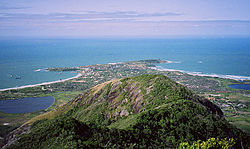Fort Dauphin (Madagascar)
|
Tolagnaro Fort-Dauphin |
|
|---|---|
 |
|
| Location of Tôlanaro (Fort-Dauphin) in Madagascar | |
| Coordinates: 25°02′S 46°59′E / 25.033°S 46.983°ECoordinates: 25°02′S 46°59′E / 25.033°S 46.983°E | |
| Country | Madagascar |
| Region | Anosy |
| Population | |
| • Total | 46,000 |
| Time zone | East African Time (GMT+3) |
| Climate | Af |
Tôlanaro or Tolagnaro (Malagasy: Tôlan̈aro [tolaˈŋarʷ]) is a city (commune urbaine) on the southeast coast of Madagascar. It is the capital of the Anosy Region and of the Tôlanaro District. It has been a port of local importance since the early 1500s, and a new port, the Port d'Ehola, has been built by QMM and the World Bank. Formerly Fort-Dauphin, it was the first French settlement in Madagascar.
Tôlañaro was initially situated on a short, narrow peninsula on the extreme southeastern coast of Madagascar. It has since grown to cover a much greater area along the ocean, almost to Mount Bezavona.
Tôlanaro has a tropical rainforest climate, though it is less rainy than areas further north on the eastern Malagasy coast. Being closer to the centre of the subtropical anticyclones than other parts of Madagascar, most rainfall is orographic, and tropical cyclones are not as common as in more northerly parts of the island.
The bay of Tolanaro was found by a Portuguese Captain in 1500. Fort Dauphin was founded on an Antanosy village, Taolankarana, in 1643 by the French East India Company who built a fort there named in honor of the crown prince, the future Louis XIV of France. It was settled by around a hundred colonists, who found themselves involved in the local politics. The poor trade results (some ebony and little more was obtained) hardly justified the difficulties of the settlers, who suffered from tropical illnesses and other problems. After a conflict with the Antanosy people, the survivors were evacuated in 1674.
One Governor of this colony, Étienne de Flacourt, published the History of the Great Isle of Madagascar and Relations, which was the main source of information on the island for Europeans until the late 19th century.
...
Wikipedia

